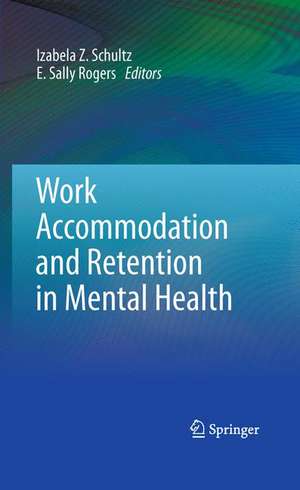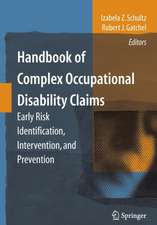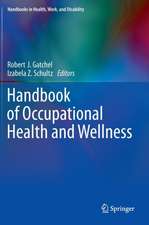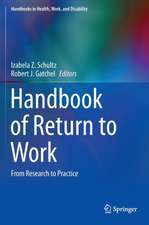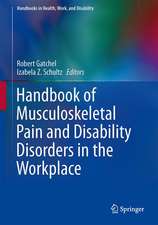Work Accommodation and Retention in Mental Health
Editat de Izabela Z. Schultz, E. Sally Rogersen Limba Engleză Hardback – 24 noi 2010
The pressure created by these powerful legislative, societal, and economic forces has not been matched by the state of evidence-based practices in the field of employment retention and job accommodation in mental health. Current research evidence is fragmented, limited in scope, difficult to access, and adversely affected by the traditional divide between the fields of psychiatry and psychology on one hand and interdisciplinary employment research and practices on the other. As a result, policy makers, employers, disability compensation systems, and rehabilitation and disability management professionals have been left without a critical "how to" evidence-informed toolbox for occupational practices to accommodate and retain persons with mental health disabilities in the workplace. Currently, no single source of knowledge and research evidence exists in the field that would guide best practices. Yet the need for workplace accommodations for persons with mental health disabilities has been growing and, based on epidemiological trends, is anticipated to grow even more in the future. These trends leave physicians, psychologists, occupational therapists, vocational rehabilitation professionals, disability managers, human resource professionals, and policy makers poorly prepared to face the challenge of integrating and maintaining persons with mental health disabilities in the workplace.
The aim of the Handbook is to close the gap between the needs of the professionals and networks that work with or study persons with mental heath disorders in an employment context and the actual knowledge base in the field. The Handbook will be written in language that can easily be understood by readers representing a multitude of disciplines and research paradigms spanning the mental health, rehabilitation, and employment fields of inquiry. The Handbook will contribute an integration of the best quantitative and qualitative research in the field, together with experts’ consensus, regarding effective work retention and accommodation strategies and practices in mental health.The book will consist of five major sections, divided into chapters written by recognized experts in these areas.
| Toate formatele și edițiile | Preț | Express |
|---|---|---|
| Paperback (1) | 380.25 lei 6-8 săpt. | |
| Springer – 4 noi 2020 | 380.25 lei 6-8 săpt. | |
| Hardback (1) | 387.58 lei 6-8 săpt. | |
| Springer – 24 noi 2010 | 387.58 lei 6-8 săpt. |
Preț: 387.58 lei
Preț vechi: 407.98 lei
-5% Nou
Puncte Express: 581
Preț estimativ în valută:
74.18€ • 77.15$ • 62.17£
74.18€ • 77.15$ • 62.17£
Carte tipărită la comandă
Livrare economică 13-27 martie
Preluare comenzi: 021 569.72.76
Specificații
ISBN-13: 9781441904270
ISBN-10: 1441904271
Pagini: 500
Ilustrații: XXI, 481 p.
Dimensiuni: 155 x 235 x 43 mm
Greutate: 0.89 kg
Ediția:2011
Editura: Springer
Colecția Springer
Locul publicării:New York, NY, United States
ISBN-10: 1441904271
Pagini: 500
Ilustrații: XXI, 481 p.
Dimensiuni: 155 x 235 x 43 mm
Greutate: 0.89 kg
Ediția:2011
Editura: Springer
Colecția Springer
Locul publicării:New York, NY, United States
Public țintă
ResearchCuprins
I. Conceptual Issues in Job Accommodation in Mental Health.- 1. Law and job accommodation in mental health disability.- 2. Mental health, neurological impairments and job accommodation: a legal perspective.- 3. Disability epidemic in mental health: epidemiological and economic impact of mental health disorders in the workplace.- 4. Effects of stigma and discrimination on the economic employment outcomes of persons with mental health disorders.- II. Mental health disorders and work functioning.- 5. Relationship between psychological impairment and occupational disability: 6. Prediction of vocational outcomes in mental health.- 7. Serious mental illness and work.- 8. Depression and work performance.- 9. Anxiety disorders and work performance.- 10. Brain injuries and work performance.- 11. Personality disorders and work performance.- 12. Learning and Attention Deficit disorders and work performance: (TBA).- III. Employment interventions for persons with mental health disorders.- 13. Integration of mental health and vocational services.- 14. Employment interventions for persons with serious mental illness.- 15. Employment interventions in depression and anxiety disorders.- 16. Employment interventions for persons with cognitive disorders.- 17. Systematic review of psychological return to work interventions for persons with mental health problems.- 18. Company-level interventions in mental health.- IV. Barriers and facilitators of job accommodations in the workplace.- 19. Employer attitudes towards accommodations in mental health disability.- 20. Mental health literacy and stigma associated with depression in the working population.- 21. Systemic barriers and facilitators to job accommodations in mental health: experts’ consensus.- V. Evidence-informed practice in job accommodation.- 22. Job accommodation as a social process: 23. Evidentiary support for best practices in job accommodation in mental health: macrosystems, employer-level and employee-level interventions.- 24. Disclosure and job accommodation for persons with mental illness.- 25. Functional capacity assessments in mental disorders and job accommodations.- 26. Disability management approach to job accommodation in the workplace
Recenzii
From the reviews:
“This book addresses how mental health issues affect employee productivity, unemployment, and underemployment, emphasizing the importance of vocational rehabilitation and job accommodation. … The primary target audience includes occupational and rehabilitation physicians, vocational rehabilitation providers, occupational therapists, psychiatrists, psychologists, neuropsychologists, and social workers who assist individuals with mental health disabilities to get and keep work. … This book addresses an employment problem, offering practical suggestions to increase job productivity.” (Gary B. Kaniuk, Doody’s Review Service, April, 2011)
“This book addresses how mental health issues affect employee productivity, unemployment, and underemployment, emphasizing the importance of vocational rehabilitation and job accommodation. … The primary target audience includes occupational and rehabilitation physicians, vocational rehabilitation providers, occupational therapists, psychiatrists, psychologists, neuropsychologists, and social workers who assist individuals with mental health disabilities to get and keep work. … This book addresses an employment problem, offering practical suggestions to increase job productivity.” (Gary B. Kaniuk, Doody’s Review Service, April, 2011)
Notă biografică
Dr. Izabela Schultz is a clinical and rehabilitation psychologist specializing in medico-legal and vocational aspects of psychological, neuropsychological and pain-related disability, both in her academic research and in her forensic practice. She is doubly Board-certified and holds the Diplomate distinctions of the American Board of Professional Psychology, in Clinical Psychology and of the American Board of Vocational Experts.
Dr. Schultz is Professor in the Counselling Psychology Program at the University of British Columbia where she also serves as Director of the newly formed graduate program in Vocational Rehabilitation Counselling. She has presented, taught and published extensively in the United States, Canada, and internationally in the area of psychosocial, vocational and psycho-legal aspects of disability. Her particular research expertise is in determination of causation of psychological disability, in multivariate prediction of occupational disability, early intervention with high risk workers and employment retention of employees with complex disabilities including mental health, brain injury and pain. She has provided expert court testimony on psychological and neuropsychological matters.
Dr. Schultz’s two previous books, Psychological Injuries at Trial (2003) and Handbook of Complex Occupational Disability Claims (2005), have contributed to an evolution of the paradigm in the occupational disability field—from medical to biopsychosocial model.
Dr. Schultz is currently co-chair of the American Psychological Association’s Task Force on Guidelines for Assessment and Treatment of Persons with Disabilities, and is on the editorial boards of several scholarly journals.
E. Sally Rogers is Director of Research at the Center for Psychiatric Rehabilitation at Boston University where she had been conducting mental health and vocational research since 1981. The Center was founded under the direction of Dr. WilliamAnthony and has focused on the rehabilitation and recovery of persons with psychiatric disability since that time. Dr. Rogers currently serves as Co-Principal Investigator of a Research and Training Center grant which is funded to carry out research studies on functioning and recovery of individuals with mental illness. She is also a Co-Principal Investigator on a grant to culturally adapt a measure on recovery for Spanish speaking mental health clients. Dr. Rogers was Principal Investigator of a post-doctoral fellowship award from NIDRR for 10 years, Principal Investigator of a multi-site grant to study consumer-operated services funded by the Center for Mental Health Services, and Principal Investigator of several smaller grants.
Dr. Rogers is a reviewer for numerous scholarly publications in the field, has developed instruments currently being used by research studies and service organizations, and is a licensed psychologist in the state of Massachusetts.
Dr. Rogers isalso Research Associate Professor at Boston University, Sargent College of Health and Rehabilitation Sciences where she has taught Masters and doctoral-level research courses and seminars. She is the recipient of the Loeb Research Award from the International Association of Psychosocial Rehabilitation Services, the 2007 ARCA award for research. Dr. Rogers has written approximately 50 peer-reviewed papers on various topics related to the vocational rehabilitation, vocational assessment, and recovery of persons with severe psychiatric disability.
Dr. Schultz is Professor in the Counselling Psychology Program at the University of British Columbia where she also serves as Director of the newly formed graduate program in Vocational Rehabilitation Counselling. She has presented, taught and published extensively in the United States, Canada, and internationally in the area of psychosocial, vocational and psycho-legal aspects of disability. Her particular research expertise is in determination of causation of psychological disability, in multivariate prediction of occupational disability, early intervention with high risk workers and employment retention of employees with complex disabilities including mental health, brain injury and pain. She has provided expert court testimony on psychological and neuropsychological matters.
Dr. Schultz’s two previous books, Psychological Injuries at Trial (2003) and Handbook of Complex Occupational Disability Claims (2005), have contributed to an evolution of the paradigm in the occupational disability field—from medical to biopsychosocial model.
Dr. Schultz is currently co-chair of the American Psychological Association’s Task Force on Guidelines for Assessment and Treatment of Persons with Disabilities, and is on the editorial boards of several scholarly journals.
E. Sally Rogers is Director of Research at the Center for Psychiatric Rehabilitation at Boston University where she had been conducting mental health and vocational research since 1981. The Center was founded under the direction of Dr. WilliamAnthony and has focused on the rehabilitation and recovery of persons with psychiatric disability since that time. Dr. Rogers currently serves as Co-Principal Investigator of a Research and Training Center grant which is funded to carry out research studies on functioning and recovery of individuals with mental illness. She is also a Co-Principal Investigator on a grant to culturally adapt a measure on recovery for Spanish speaking mental health clients. Dr. Rogers was Principal Investigator of a post-doctoral fellowship award from NIDRR for 10 years, Principal Investigator of a multi-site grant to study consumer-operated services funded by the Center for Mental Health Services, and Principal Investigator of several smaller grants.
Dr. Rogers is a reviewer for numerous scholarly publications in the field, has developed instruments currently being used by research studies and service organizations, and is a licensed psychologist in the state of Massachusetts.
Dr. Rogers isalso Research Associate Professor at Boston University, Sargent College of Health and Rehabilitation Sciences where she has taught Masters and doctoral-level research courses and seminars. She is the recipient of the Loeb Research Award from the International Association of Psychosocial Rehabilitation Services, the 2007 ARCA award for research. Dr. Rogers has written approximately 50 peer-reviewed papers on various topics related to the vocational rehabilitation, vocational assessment, and recovery of persons with severe psychiatric disability.
Textul de pe ultima copertă
Work Accommodation and Retention in Mental Health Izabela Z. Schultz and E. Sally Rogers, Editors Mental illness has long been recognized as a cause of unemployment and decreased job productivity. More recently, a myriad of social, legal, and demographic factors have brought more people with mental health impairments into the workplace, resulting in considerable practical questions for employers, rehabilitation specialists, and other professionals, particularly on accommodation and retention issues. Work Accommodation and Retention in Mental Health occupies a unique place in the mental health and vocational rehabilitation literature by assembling a scattered and fragmented knowledge base into an evidences-informed sourcebook and how-to guide. With its in-depth background on conceptual and legal issues, extensive discussion of the effects of psychological conditions on work outcomes, and equal emphasis on clinical and occupational interventions, this book is accessible to readersacross a wide range of disciplines seeking effective job retention and accommodations strategies in mental health. Included in the this coverage: •A conceptual framework for job accommodations in mental health. •The relationship between psychological disorders and work performances. •Employment interventions for mental health disorders. •Barriers and facilitators to job accommodations. •Evidence-based best practices. •Future discretions for improving work outcomes for those with mental illnesses. Work Accommodation and Retention in Mental Health will solve a multidisciplinary readership in occupational medicines, psychiatry, clinical rehabilitation, industrial/organizational, and neuropsychology; vocational rehabilitation counseling; occupational therapy; disability management; and human resources management.
Caracteristici
The only evidenced-based handbook focusing on job accommodations for workers with mental health conditions. Edited and authored by well-known experts working at the interface of mental health and vocational rehabilitation. Avoids the pitfall of most books on mental health in the workplace which focus on issues of stress on the job and while interest in job accommodations for workers with mental health conditions is minimal or absent. Includes supplementary material: sn.pub/extras
